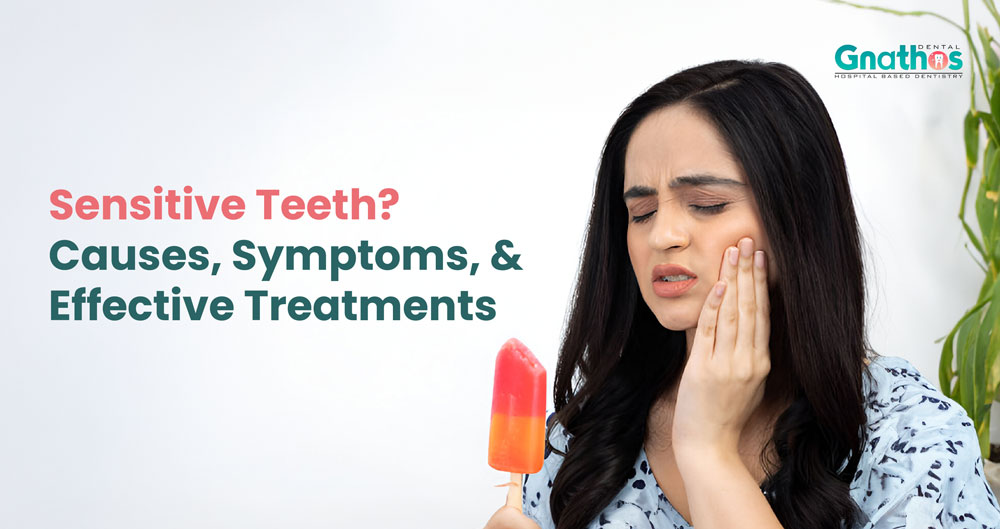
Understanding Sensitive Teeth: Causes, Symptoms, and Effective Treatments
We’ve all been there—taking a big bite of ice cream or a sip of steaming coffee, only to feel a sudden sharp pain shoot through our teeth. That familiar discomfort is often a sign of sensitive teeth, a condition affecting millions of people worldwide. But what causes this sudden reaction, and what can be done about it? Let’s dive deeper into understanding dentin hypersensitivity, the reasons behind it, and how you can effectively manage the issue.
What Does It Feel Like to Have Sensitive Teeth?
Sensitive teeth are often described as experiencing a short, sharp pain when your teeth come in contact with certain stimuli. This could be anything from cold or hot beverages and sweet treats, or even breathing in cold air. Some people may experience mild discomfort, while for others, the sensation in teeth can be more chronic. The pain occurs when the softer parts of your teeth—known as dentin—become exposed due to enamel loss or gum recession, allowing external stimuli to reach the nerves.
For many, this condition is mild, but for others, it can turn into painful sensitive teeth that make eating, drinking, or even brushing uncomfortable. Understanding the reason for sensitive teeth is crucial in preventing it from worsening.
Common Causes of Sensitive Teeth
Sensitive teeth can be triggered by various factors, many of which are preventable. Here are some of the most common causes:
-
Enamel Erosion
The outermost layer of your teeth, enamel, protects the sensitive inner layers. Over time, enamel erosion can occur due to acidic foods, soft drinks, or aggressive brushing, leading to dentin hypersensitivity. Once the enamel is gone, the sensitive teeth underneath are left vulnerable.
-
Gum Recession
Gum recession happens when the gums around your teeth start to pull away, exposing the roots. Since these roots don’t have the protective enamel layer, they are prone to sensitivity. Gum recession is often a result of periodontal disease, harsh brushing, or aging.
-
Tooth Decay or Cavities
Tooth decay and cavities are often linked to poor oral hygiene. When decay breaks down the tooth structure, it opens a pathway for external stimuli to reach the nerves, causing sensitivity. Addressing cavities early can prevent further complications.
-
Tooth Fractures or Cracks
Accidents, biting down on hard objects, or general wear and tear can cause cracks in the teeth. These cracks can expose the nerves inside your teeth, leading to sudden pain when you eat or drink. Teeth filling hurts are also common when fractures extend near the nerve, especially if a filled tooth hurts after dental work.
-
Recent Dental Procedures
Temporary sensitivity can follow dental treatments like cleanings or fillings. However, if your teeth filling hurts persistently, it’s essential to consult your dentist for dental sensitivity treatment.
-
Other Contributing Factors
Teeth grinding (bruxism), using acidic mouthwash, and consuming acidic foods regularly can worsen sore sensitive teeth. Even a head cold and tooth pain can intensify tooth sensitivity.
Symptoms of Sensitive Teeth
Dealing with sensitive teeth presents several specific symptoms, which can vary in intensity:
-
Sharp Pain
A sudden, sharp pain is a hallmark of painful sensitive teeth. This typically happens when triggered by hot or cold foods and drinks, sugary snacks, or acidic foods.
-
Discomfort During Brushing or Flossing
Teeth are suddenly sensitive when brushing or flossing, especially near the gums. This could be due to gum recession or sensitive teeth caused by enamel loss.
-
Temperature Sensitivity
Cold teeth sensitivity is a common complaint among those with dental sensitivity, making simple tasks like drinking cold water or eating ice cream unbearable.
Treatment and Management of Sensitive Teeth

Managing sensitive teeth requires an approach tailored to the cause and severity. Here are some sensitive teeth solutions:
-
Desensitizing Toothpaste
Toothpaste designed for sensitive teeth blocks the pathways from the tooth surface to the nerve, providing sensitive teeth treatment over time.
-
Fluoride Treatments
Fluoride strengthens enamel and reduces dentin hypersensitivity. Dentists may recommend fluoride gels or varnishes to help manage dental sensitivity treatment effectively.
-
Dental Sealants
In more severe cases, dental sealants can act as a barrier over exposed sensitive teeth, helping to prevent further damage and providing instant sensitive teeth relief.
-
Avoiding Triggers
Avoiding hot, cold, and acidic foods can provide sensitive teeth cure and prevent further sensitivity. Try limiting sugary snacks to reduce teeth filling hurts.
-
Correct Brushing Techniques

Adopting gentler brushing methods, like using a soft-bristled toothbrush, can prevent sensitive teeth from getting worse.
-
Professional Dental Procedures
For severe sore sensitive teeth, dentists might recommend bonding, crowns, or root canal therapy to restore the tooth’s structure and protect the sensitive inner layers.
When to See a Dentist?
While mild sensitivity can often be managed at home, there are times when professional help is necessary. Here are some signs that you should see your dentist:
-
Persistent or Severe Pain
If your tooth sensitivity becomes chronic or the pain is too intense to manage with over-the-counter solutions, it’s time to consult a dentist for sensitive teeth treatment options. Persistent pain could be a sign of more serious underlying issues like deep cavities, cracks, or gum disease.
-
Pain Accompanied by Other Symptoms
If you notice swelling, bleeding gums, or a foul taste in your mouth alongside the sensitivity, you could be dealing with an infection or advanced gum disease. Early intervention is crucial to prevent further damage.
-
Lack of Improvement with Home Treatments
If home remedies for sensitive teeth, like desensitizing toothpaste, don’t work, a dentist can recommend stronger sensitive teeth solutions.
Conclusion
Sensitive teeth can be more than just a minor annoyance—they can affect your quality of life. By identifying the sensitive teeth cause and following proper sensitive teeth treatment, you can minimize discomfort. Regular dental visits, along with careful at-home care, can provide instant sensitive teeth relief and prevent further issues. If your symptoms persist or your teeth are suddenly sensitive without improvement, seeking professional dental sensitivity treatment is key to lasting relief.
- Tags:
- cold teeth sensitivity
- dental sensitivity treatment
- dentin hypersensitivity
- filled tooth hurts
- gum by tooth hurts
- head cold and tooth pain
- home remedies for sensitive teeth
- instant sensitive teeth relief
- medication for sensitive teeth
- my teeth hurts
- my tooth is painful
- painful sensitive teeth
- reason for sensitive teeth
- sensation in teeth
- sensitive teeth
- sensitive teeth cause
- sensitive teeth cure
- sensitive teeth solutions
- sensitive teeth treatment
- sore sensitive teeth
- teeth are suddenly sensitive
- teeth filling hurts
